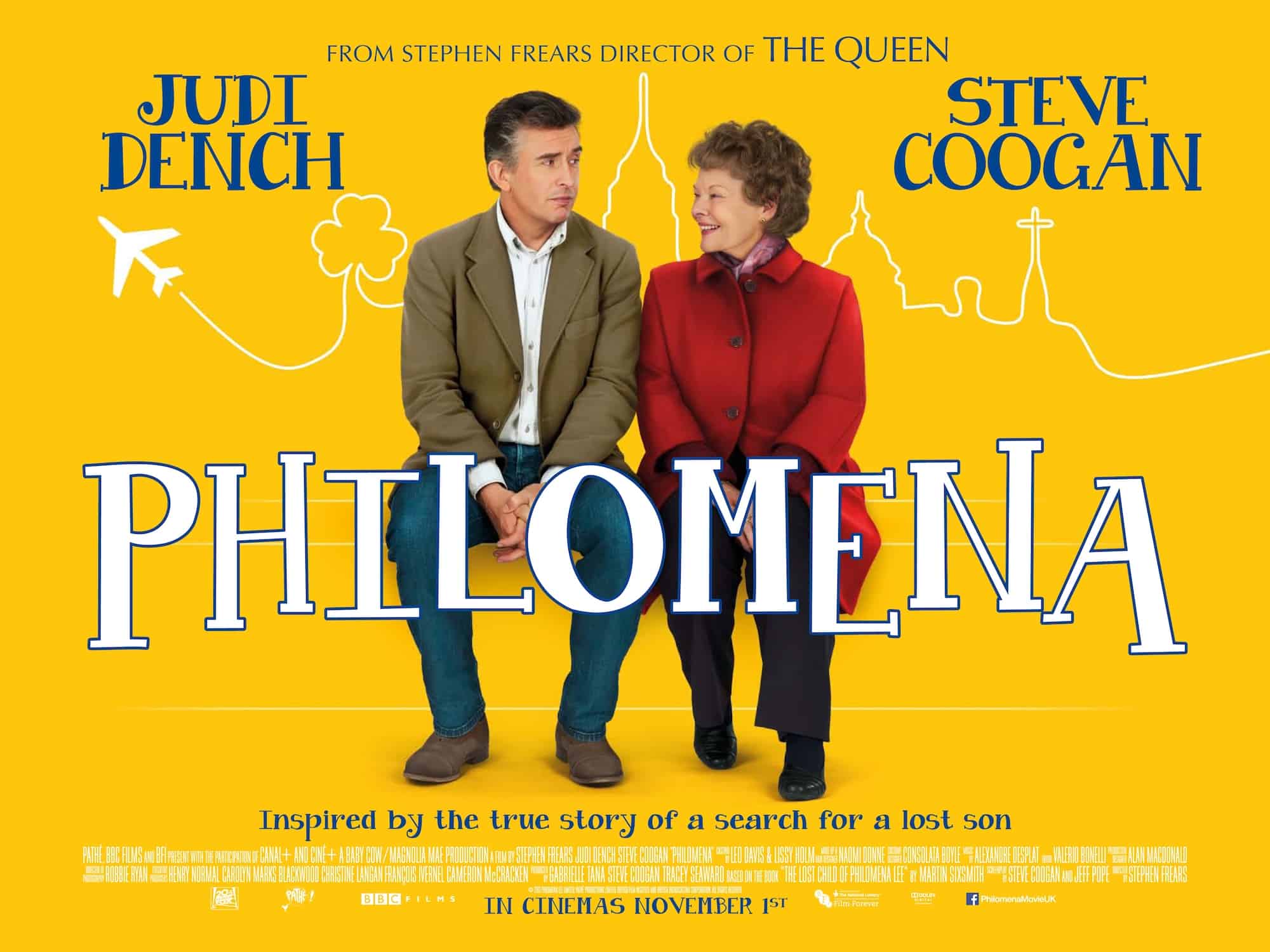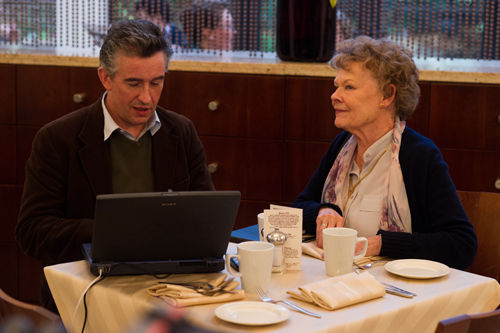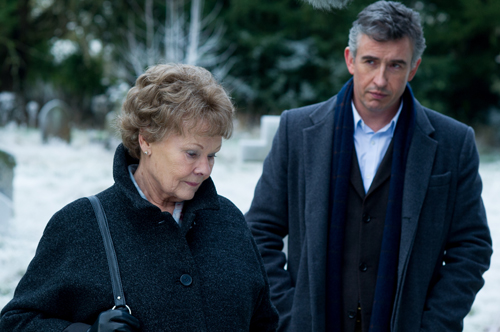This post was first published in Film & Bible Blog. © Tony Watkins 2013.
For discussion material on this film, see Sophie Lister’s Damaris Film Blog discussion guide and the supplementary questions in the published version of this article in the Film & Bible Blog

Philomena Lee (Judi Dench) has lived with a secret for five decades. As a devout Roman Catholic, she has wrestled with the question of whether her sin of deception is greater or lesser than the sin which she has been covering up: having a baby outside of marriage. In Ireland in the early fifties, this was a scandal so terrible that, when Philomena’s pregnancy was discovered, she was sent to the convent in Roscrea. There she was to have her baby – without pain relief, regardless of complications – before slaving in the convent laundry seven days a week for the next four years. This was her penance as a ‘fallen woman’. Philomena was allowed to see her son, Anthony, for just one hour a day. Then with no warning, when Anthony was just three when years old, he was taken away by an American couple who had paid to adopt him. She never saw him again.
Fifty years on, Philomena no longer feels able to keep her secret, and she tells her daughter Jane (Anna Maxwell Martin) what happened. While waitressing at a party later that evening, Jane encounters journalist Martin Sixsmith (Steve Coogan, who co-produced and co-wrote the film), recently sacked from his post as a Labour party spin doctor and unsure about what to do next. Despite deriding ‘human interest’ stories as being for ‘vulnerable, weak-minded, ignorant people’, what Jane tells him grabs his attention, and he soon agrees to help Philomena find her son, and to write an article about it for a newspaper.
 Judi Dench and Steve Coogan in Philomena. © Pathé, 2013. Used by permission.
Judi Dench and Steve Coogan in Philomena. © Pathé, 2013. Used by permission.
The intellectual, middle-class Englishman and the elderly, down-to-earth Irish woman make an odd couple as they embark on their search. Martin is a hard, cynical journalist who seems to be driven as much by anger at the injustices experienced by Philomena at the hands of the Catholic Church as by the need to have his article published. His background as a former altar boy[1] who has turned his back on God feeds into this. When Philomena wants to go to confession, Martin’s anger bursts out: ‘The Catholic Church should go to confession, not you! Forgive me, Father, for I have sinned. I incarcerated a load of young women against their will, used them as slave labour, and sold their babies to the highest bidder.’
Philomena, by contrast, is warm-hearted, sees the good in everybody, and has a simple faith in God – though her understanding of him owes much more to the nuns’ teaching than to the Bible. Yet alongside her faith she carries an intense burden of guilt, which has overshadowed her life for half a century. ‘What made it so much worse is that I enjoyed it,’ she says to Martin. ‘The sex. It was wonderful… . And after the sex was over, I thought, anything that feels so lovely must be wrong.’ This view of sexuality is completely at odds with Martin’s perspectives, and he swears strongly, before explaining his problem: ‘It’s just that, why would God bestow upon us a sexual desire that he then wants us to resist? Is it some weird game he’s invented to alleviate the boredom of being omnipotent? Baffles me. And I think I’m pretty clever.’ ‘Well, maybe you’re not,’ Philomena responds. His Oxbridge education and high-flying career count for little in her eyes.
 Steve Coogan and Judi Dench in Philomena
Steve Coogan and Judi Dench in Philomena
© Pathé, 2013. Used by permission.
There’s plenty that baffles Martin when it comes to religion, which he dismisses as ‘blind faith and ignorance’:
I read a very funny headline in a satirical newspaper the other day, about the earthquake in Turkey. It said ‘God outdoes terrorists yet again.’ Why God feels the need to wipe out hundreds of thousands of innocent people escapes me. You should ask [the priest] about that while you’re in [confession]. He’ll probably say, ‘He moves in mysterious ways.’
Martin’s vaunted cleverness elicits another quick put-down from Philomena: ‘No. I think he’d say you were a fecking eejit.’ No answers to Martin’s challenge are forthcoming, however. And when Philomena goes into the confession box, wordlessly weeping for her lost boy as much as for any of her sins, the priest is unable to say any more than ‘Have faith, my dear. God will forgive you.’
 Steve Coogan in Philomena
Steve Coogan in Philomena
© Pathé, 2013. Used by permission.
Martin finally comes face to face with Sister Hildegarde (Barbara Jefford), who meted out much of the cruelty Philomena endured in the convent, and he voices his anger: ‘what’s disgusting is lying to a dying man. You could have given him a few precious moments with his mother before he passed away, but you chose not to. That’s disgusting… . Not very Christian is it?’’ When Sister Hildegarde claims that, ‘The Lord Jesus Christ will be my judge, not the likes of you,’ Martin challenges her understanding of Jesus’s values: ‘Really? Because I think if Jesus was here now he’d tip you out of that f****** wheelchair and you wouldn’t get up and walk!’
The idea that Jesus would tip an old woman out of her wheelchair is unlikely, but the God-denying journalist is actually much closer to an understanding of Jesus’s values than the nun. Jesus’s strongest words were directed at the self-righteous religious people, who ‘crush people with unbearable religious demands and never lift a finger to ease the burden’ (Luke 11:46). What Sister Hildegarde expresses is at odds with the Bible: ‘I have kept my vow of chastity my whole life. Self-denial and mortification of the flesh – that’s what brings us closer to God. Those girls have nobody to blame but themselves, and their own carnal incontinence… . Their suffering was atonement for their sins.’ She understands the seriousness of sin, but nothing else.
 Steve Coogan and Judi Dench in Philomena
Steve Coogan and Judi Dench in Philomena
© Pathé, 2013. Used by permission.
Nowhere does the Bible ever suggest that we can make atonement for our sins through suffering. On the contrary, it insists that we are helpless to do anything about it. In his letter to the church in Rome, the apostle Paul says that all kinds of behaviour put us under God’s judgment (see Romans 1:8–34) – all arising from the basic human disposition to value something more highly than God in our lives. He goes on to argue that we can never become righteous enough for God through what we do: ‘For no one can ever be made right with God by doing what the law commands. The law simply shows us how sinful we are’ (Romans 3:20). In the Old Testament, the prophet Isaiah makes the same point: ‘All of us have become like one who is unclean, and all our righteous acts are like filthy rags; we all shrivel up like a leaf, and like the wind our sins sweep us away’ (Isaiah 64:6).
Paul insists that we are helpless to do anything about our predicament, but that God himself did everything necessary for us to be forgiven through the death of his son, Jesus Christ:
When we were utterly helpless, Christ came at just the right time and died for us sinners. Now, most people would not be willing to die for an upright person, though someone might perhaps be willing to die for a person who is especially good. But God showed his great love for us by sending Christ to die for us while we were still sinners. And since we have been made right in God’s sight by the blood of Christ, he will certainly save us from God’s condemnation. For since our friendship with God was restored by the death of his Son while we were still his enemies, we will certainly be saved through the life of his Son. So now we can rejoice in our wonderful new relationship with God because our Lord Jesus Christ has made us friends of God. (Romans 5:6–11)
 Judi Dench and Steve Coogan in Philomena
Judi Dench and Steve Coogan in Philomena
© Pathé, 2013. Used by permission.
Contrary to what Sister Hildegarde says, we do not get closer to God by our actions, and nobody atones for their sins through suffering. The Bible teaches that we come to God simply through faith in his grace and mercy, and that Jesus atones for us through his suffering: ‘Christ suffered for our sins once for all time. He never sinned, but he died for sinners to bring you safely home to God’ (1 Peter 3:18). The priest in the confessional box may not have said much, but what he did say pointed in exactly the right direction: ‘Have faith, my dear. God will forgive you.’
It’s hard to be sure quite what Philomena understands of her faith, but she does finally see that it is about grace, not condemnation. While Martin is full of righteous anger at Sister Hildegarde, Philomena simply says to her, ‘I want you to know that I forgive you.’ Martin is astonished at this apparently easy forgiveness, but Philomena insists that it’s no such thing: ‘That’s hard for me. But I don’t want to hate people. I don’t want to be like you.’ Martin and Hildegarde come from very different places, but they are both characterised by self-righteous denunciation of others. Philomena, however, understands at least a little of the heart of Jesus. When a woman caught in adultery was brought before Jesus, he challenged her accusers saying, ‘let the one who has never sinned throw the first stone’. When they all slipped away, leaving only the woman with Jesus, he said to her, ‘Where are your accusers? Didn’t even one of them condemn you? … Neither do I. Go and sin no more’ (John 8:1–11).